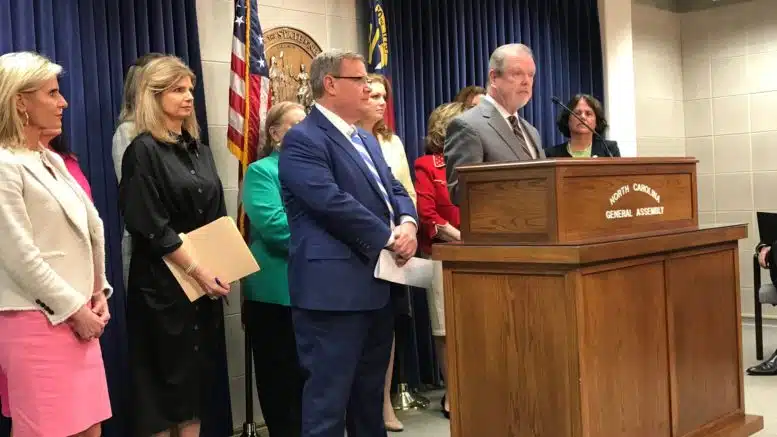By Anne Blythe, Rachel Crumpler and Rose Hoban
North Carolinians have been able to get abortion care up to 20 weeks into their pregnancies, but that may be subject to change. Republicans in the Senate and House of Representatives came to an agreement on proposed legislation to limit access to abortion after 12 weeks gestation.
Key Republican lawmakers rolled out their compromise bill Tuesday evening during a briefing with reporters. The proposed legislation sets the 12-week restriction while attempting to bow to public opinion with enticements such as funding for maternal care, parental leave for state employees and increases in the rates paid to child care providers.
“The Senate and House Republican caucuses have come to an agreement on pro-life legislation,” Senate leader Phil Berger, a Republican from Eden, said shortly before 7 p.m. “The bill that has been developed is a common sense, reasonable approach to restricting second- and third-trimester abortions and addressing maternal and infant care.”
Berger was joined by House Speaker Tim Moore, a Kings Mountain Republican, in a show of unity that often doesn’t exist between chambers.
The bill was introduced two days before the “crossover” deadline, when proposed legislation has to get through votes in one of the legislative chambers in order to be considered this year or next.
Moore said House Republicans who developed the bill behind closed doors “do not take this responsibility lightly.” The negotiating lawmakers included Republican women from both chambers who were at the press room podium with Berger and Moore before getting into the details of the proposed legislation, which had not yet been made available for public perusal.
“We have dealt with not only the issue of abortion, but also health care when it comes to mother’s health care of children, and really trying to provide a comprehensive approach in a way that is compassionate,” Moore added.
“I think the message we want to get across here is that life of the mother is imminently prioritized, and it always is,” said Rep. Kristin Baker (R-Concord). “I think it’s especially important that, when we’re looking at this bill, we are protecting the mother and we are protecting the baby.”
Months in the works
The lawmakers said they discussed a range of options — from limiting the procedure at conception to allowing abortion up until birth. They settled on restricting abortion access during the second and third trimesters.
From 2016-2020, an average of 86.7 percent of North Carolina abortions took place before 12 weeks.
Republicans started working months ago to craft legislation that could be palatable to both chambers — and to moderate voters, as well.
Republicans say their bill has full commitment from the entire Republican caucus. Sen. Amy Galey (R-Burlington) said they approached Democrats to join them but got no takers.
“We worked at it long and hard for five and a half months,” said Rep. Sarah Stevens (R-Mt Airy). “We took into account a lot of what was going on, and we didn’t feel like it needed to be dragged out that much further.”
Lawmakers built upon Senate Bill 20, which was filed Jan. 25, initially as a bill around safe surrender of infants.
Lawmakers stripped the old language from the bill, dropping in new restrictions on abortion that include compelling women to receive pre-procedure counseling in person instead of by phone or online, as is allowed now. Women then have to wait 72 hours before returning to their provider for the procedure, whether they are taking a pill or having a surgical abortion.
The bill includes money for contraception, funds targeted at reducing maternal morbidity, adoption tax credits and more funding to foster care and to fund increases in the rates paid to child care centers. In addition, the plan funds paid parental leave for state employees, with up to eight weeks for birth moms and four weeks for spouses or adoptive parents.
The bill also includes a provision that would give certified nurse-midwives more autonomy to practice without oversight of a physician after 4,000 hours of supervised practice.
After Roe v. Wade
Republican leaders in the state Senate and House of Representatives have hinted since last year that changes would be introduced.
In the Dobbs decision on June 24, 2022, the U.S. Supreme Court overturned Roe v. Wade; their ruling last summer shifted decision-making about abortion access to individual states.
Some states quickly enacted laws to protect abortion rights, with
Oregon adopting the most protective in the country. Other states, especially a wide swath from Texas east to Tennessee, instituted outright bans or very restrictive laws.
People across the country — and across the South — were watching North Carolina, which currently allows abortions up to 20 weeks into a pregnancy, to see if the state would enact more stringent rules.
Lawmakers have been mindful that moderate voters in other states, such as Kansas and Wisconsin that quickly proposed bans, have handed electoral defeats to the Republicans supporting those restrictions.
Sen. Joyce Krawiec (R-Winstston-Salem) noted that a March 2023 poll found that 57 percent of North Carolina voters support an abortion ban at the end of the first trimester of pregnancy.
Although the General Assembly has Republican supermajorities in the Senate and the House, Gov. Roy Cooper is a Democrat who has advocated for the rights of pregnant people to make decisions about their health care with their physicians. He has vetoed previous attempts to limit abortion access.
Under the new rules, abortion would be allowed past 12 weeks if there is an instance of rape or incest. People claiming rape or incest would only need to report that to their doctor, who would list that in information collected by the state Department of Health and Human Services.
“So that is between the doctor and the patient,” Stevens said.
In those cases, and in the case of life-threatening anomalies for the fetus, or threats to the life of the mother, access to a surgical abortion could be extended to 24 weeks.
When asked what penalties would be imposed for any patients or medical providers that don’t follow these guidelines, Stevens responded that doctors could be fined $5,000 and face any other sanctions the North Carolina Medical Board might impose.
Reaction from providers
In addition to new rules around abortion, lawmakers added funding for a variety of women’s and children’s health initiatives.
- DHHS grants to local health departments and nonprofit community health centers: $3.5 million recurring
- Increased Medicaid reimbursement rate: $2.8 million recurring plus $5.5 million in matching federal funds
- Foster care: $10 million recurring
- Child care grants: $32 million in the 2023-24 fiscal year and $43 million in the 2024-25 fiscal year to boost reimbursement to child care centers
- Long-acting contraceptives: $3.5 million to community health centers to increase access to underserved, underinsured patients
- Maternal morbidity: $2.8 million
- Paid maternity and paternity leave for teachers and state employees: $10 million
- Grants for college students who get pregnant to help them have their babies and graduate from their programs: $1.5 million in recurring funds
Despite the new funding being put toward maternal health supports, obstetrician-gynecologists on the front line of high-risk maternity care expressed frustration at the proposed restrictions.
Sign up for our Newsletter
“People are living their very ordinary lives, just trying to do the best they can for their families, for themselves, for their health — and there are things that happen, reasons why people will seek care after 12 weeks,” said Beverly Gray, an OB-GYN from Duke Health who specializes in high-risk pregnancies. “As a provider I see these patients and provide them care with compassion, and with a deep amount of respect and care. And I think it’s unfortunate that these legislators can’t bring that same compassion and care to this issue.”
Gray also noted that since the Dobbs decision and subsequent restrictions enacted in other states, there’s been a drop off in medical school graduates who choose to do their medical residencies in states with more stringent regulations around abortion. She worries that North Carolina will lose out on talented young physicians if the state enacts this 12-week restriction.
“Applicants are looking at where they can get comprehensive medical training and comprehensive training in OB-GYN, and if there’s a strict abortion ban, they do not get the same training. And so they’re making decisions, about where they train and where they live, based on what legislators are doing.”
The proposed legislation will be shepherded through the chambers in a political process that excludes public comment. Final votes in each chamber could be as soon as Thursday, Berger said.
That frustrated advocates for abortion access.
“Lawmakers have ignored their own deadlines, flagrantly disregarded the entire committee process and eliminated any chance for the public to speak against this sweeping ban,” said Jillian Riley, a spokeswoman for Planned Parenthood South Atlantic. “They know what they’re doing is wrong and deeply unpopular.”









